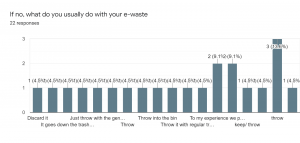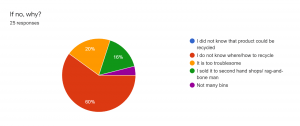e-Waste is defined by the National Environmental Agency (NEA) as discarded electronic products, which consists of all products that require an energy source in the form of battery or power sockets. Take a look around! At the end of their lifespan, many of these appliances that we see around us are classified as e-waste – from your mobile devices to your refrigerator and electronic toys.
Hello friends! Welcome back to my blog! 😊 In my previous post, I mentioned that recycling our e-waste can help to reduce the demand for new metals and hence reduce the environmental impact of mining. How else can recycling our e-waste help the environment?
I recently conducted a survey with 30 participants on their e-waste disposal practices, about 40% of them being my BES coursemates and the rest being polytechnic or university students. In one of the questions, I asked the respondents how they dealt with their e-waste if they did not recycle them, and they unanimously responded that they throw their e-waste away together with general waste.

Not recycling or disposing of e-waste properly contributes to environmental damage. When thrown away with general trash, the e-waste ends up in landfills. Harmful pollutants such as lead and chromium can leak out from the batteries, degrading the quality of water, the air and soil and pose as a health hazard for humans. Yet, the amount of e-waste we are generating is rising.
So, what can we do about this? How can we help?
Well first, let’s try to find out why people are not recycling or disposing of their e-waste properly.
I asked the respondents if they usually recycle their e-waste, and if not, why. Majority of them do not, mainly because they do not know where/how to recycle.


Which I can understand. I too am guilty of disposing of my e-waste together with general trash. Reflecting on it, I realised that I was not aware of the severity of improper e-waste disposal until I was researching about it for this post, thus I never really bothered looking for ways to dispose of e-waste properly. Maybe because e-waste recycling is a relatively new concept, compared to recycling other waste like plastics and paper; I don’t recall being taught about the impacts of improper disposal of e-waste in school. Similarly, I believe that others too, maybe unsure on how to recycle and dispose of e-waste properly.
Thus, I decided to act on this. Seeing that most of the respondents are around my age, and I decided to use social media platforms to effectively reach out and educate more people. From another question in the survey, I realized that not everyone knows what can be classified as e-waste.

Hence, I created a few posts introducing what e-waste are, the consequences of improper disposal and tip on how to properly dispose and recycle these items to be posted on my social media.

I hope that more people will become conscious of this issue and try to practice e-waste recycling in the future. To start off, I looked up the e-waste collection points nearest to my house here, and you can use it to find yours too!
Cheers
Alicia 😊
Hi Alicia,
Nice to see you using social media to educate others on e-waste, those infographics you made look really great and informative! 🙂 I was one of your respondents and I usually sell my used electronic products that are still functional on Carousell instead of recycling them. I wanted to know your opinion on whether selling our unwanted electronic products to 2nd hand shops/rag-and-bone man/other people or recycling them is a better option to deal with e-waste.
Cheers,
Si Ying
Hi Si Ying! Thank you for reading my blog! Yes, I definitely agree that selling our unwanted electronic products that are still usable is a more environmentally friendly option than recycling/throwing them away. For spoilt electronics, however, selling e-waste to the rag-and-bone man or 2nd hand shops, will not make much of a difference in my opinion, as most of the electronics that cannot be repaired are still thrown away/recycled. The rapid development of technology has made electronics harder or more expensive to repair as some parts become obsolete or hard to find/obtain. Still, these methods may be able to provide income eg. for the rag-and-bone man. You may be interested in my next post which is about the throwaway culture of electronics!
Hi Alicia,
This post is WONDERFUL overall !
What an inspiring thing to do ! Never mind how engaging, well-written and clever it is (and with primary research). Great job !
All that said, are you aware of NEA’s e-waste programme and its emphasis on manufacturer recovery (aka EPR) ? You can Google “NEA e-waste” and find out more.
I’ll also correct one thing from this post. There is no programme in SG to collect and dispose of used batteries. NEA advises us to throw them in the regular rubbish bins. They then get incinerated in the waste-to-energy plants.
One last thing… there are regular e-waste collection drives right at NUS. They’re held by NUS SAVE, so that might be convenient for you folks.
jc
Hi Dr Coleman! Thank you so much for the encouragement! Yes, I have heard of the EPR that is part of the Resource Sustainability Act implemented last year. From my knowledge, the RSA aims to reduce e-waste, packaging waste and food waste by 2025, which I think is a big step in the right direction to create a more sustainable future for the generations to come. And I just looked at NUS SAVE’s Facebook page and it’s really heartwarming to see so many like-minded people who are passionate about the environment! 🙂
Hi Alicia, Wen Han here! This blog is relatable because I am one of the many culprits who discard e-wastes as ‘general trash’. After reading your blog, I made it a point to separate e-waste from other recyclables so I can recycle them at the end of every month (Thanks for the link to the nearest e-waste collection point!)
Growing up, I have seen the shift of demographics in the age group of kids who use handphones or electronic devices for recreational or educational purposes. Kids are already learning how to use smartphones at 4 years old! (I was probably still running around in playgrounds or doodling away) Therefore, I was wondering if young kids should be educated on proper e-waste disposal too?
Hi Wen Han! Thank you for reading my blog! Glad to know that my post impacted you to take action too! 🙂 Yes, I definitely think that young kids should be educated on proper e-waste disposal. I still remember my teachers (repeatedly) teaching us about the 3Rs and which items can or cannot be recycled, so I think that schools will be a good place to start. Studies also show that children can influence their parents’ beliefs too, thus the young can influence their families to adopt proper e-waste disposal practices too! Of course, the adults too should be more informed as they generate e-waste too (and probably makes the decisions about the disposal of e-waste on behalf of their kids). There is a rising amount of e-waste generated, and this trend is unlikely to change anytime soon unless more people are educated on proper e-waste disposal.